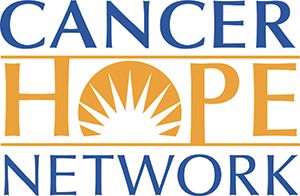Meet Kristin: Cancer Survivor Finds Meaning and Purpose Helping Others

Ovarian cancer survivor trained as peer mentor volunteer as part of CHN’s pilot program with Stanford Health Care.
“I was 35 with two little kids, and I didn’t know what I was doing,” recalls Support Volunteer Kristin of her initial diagnosis more than 24 years ago. “I didn’t know the number of appointments I’d need to navigate or the amount of side effects I’d face. If I can just give my matches even one nugget of information, that would be great.”
The nuggets of wisdom she shares are hard won. Kristin’s cancer was discovered when she felt like she was having contractions — but wasn’t pregnant. She also had a history of endometriosis and adenomyosis prior to her cancer diagnosis, so Kristin’s care team recommended a hysterectomy.
Kristin was trained as a Support Volunteer earlier this year. She is part of a pilot program between Stanford Health Care and Cancer Hope Network. The pilot’s goal is to help mitigate patients’ and caregivers’ fear and ambiguity around cancer diagnosis, treatment, and clinical trials. It’s an opportunity for patients and caregivers in the East Bay area to receive free and confidential support — and for survivors and caregivers like Kristin to share their hard-won wisdom.
Initially diagnosed with a slow-growing endometrioid tumor, Kristin was closely monitored by her health care team. In addition to the full hysterectomy, Kristin also underwent a lymph node dissection. A year later, she returned from a family vacation and landed in the emergency room. She needed major surgery for a tumor that caused a “humongous” blood clot pressing on her femoral artery.
Shortly thereafter, she was diagnosed with adenosarcoma, which had spread, with lesions on her liver, requiring removal of eight inches of her colon and a re-built bladder. She spent more than 16 days in the ICU and hospital, and when she recovered, started 10 months of grueling chemotherapy that caused hair loss and neuropathy, which she still has today. She was prescribed Megace and quickly gained 40 pounds, which was extremely difficult.
After 15 years, she had a recurrence of her cancer with more surgery, chemotherapy and radiation. With the removal of part of her small bowel and the inability to properly digest foods, the treatments that saved her life have often been followed by unexpectedly challenging side effects.
She is thankful to the family and friends who rallied around her during each of her bouts.
Today, she’s found perspective. “While I have all these things to deal with, the alternative is that a lot of people die from ovarian cancer. I’m still here and that’s something I remind myself of all the time.”
She’s used her own struggle to empower others, helping normalize discussions of “embarrassing” health issues. “If I have a large cut on my arm and ask everyone to look at it, it’s acceptable. But if you’re starting to talk about your body parts and bodily fluids — and there’s a lot of that with ovarian cancer — it’s really hard.
The self-proclaimed worrywart has introduced meditation into her daily routine, and it is helping. “Meditation didn’t change me….but it helped calm me down. It helps me save my worry for when it’s necessary.”
She’s also seeing benefits from her lifelong passion for exercise. “I enjoy it. I feel really good when I exercise, and that has helped me feel better.” Faced with long-term neuropathy (you can find her tripping her way through life)she’s learned to give herself grace when bumping up against new physical limitations. “Sometimes, you want everything to be better. But it’s helpful to remember that “even if I feel 10% better, it’s progress,” she encourages.
Kristin is an active member of Stanford Medicine’s Cancer Patient Family Action Committee (PFAC), a group of volunteers committed to the patient experience at Stanford. It’s been a fulfilling experience — “we provide specific feedback and insights to the coordinators, and they make real changes, which is phenomenal.” When she learned of an opportunity to serve in new ways through the pilot program between Stanford Health and Cancer Hope Network , she leapt at the chance to put her longtime passion for providing peer support into action.
Kristin has always been a helper — providing guidance and answering questions for other patients she met — but she found the training offered by Cancer Hope Network especially useful. “Training is very concise. The commitment to complete the coursework is fairly minimal, but you get so much out of it, learning what to do and what not to do when talking to a patient. It gave me confidence and guidance.”
She is passionate about her work as a volunteer – and thankful for the wide range of support offered through this pilot program. She joins Cancer Hope Network’s national bench of volunteers who’ve faced more than 80 types and sub-types of cancer, speak 15 languages and range in age from 19-94.) “Cancer Hope Network is like one stop shopping. It provides support for people wherever they are in life,” she said. “They’re like command central for matching people looking for a mentor with a volunteer who is a good fit.”
“From our earliest conversations one thing has become clear. Stanford PFACs are made up of extraordinary people who are committed to improving the healthcare experience of others,” said CHN Programs Director Samantha Schrager. “That focus on helping others is shared by the broader community of Cancer Hope Network volunteers and another reason we are so pleased to combine resources and efforts with our friends at Stanford.”
To learn more about becoming a volunteer or to request a free and confidential match with a trained Support Volunteer through the Stanford pilot program, visit cancerhopenetwork.org/Stanford.
For health care and nonprofit professionals interested in teaming up with Cancer Hope Network to provide support for their patients, please contact Sarah Miretti Cassidy, Director of External Affairs, 908.879.4039 or
